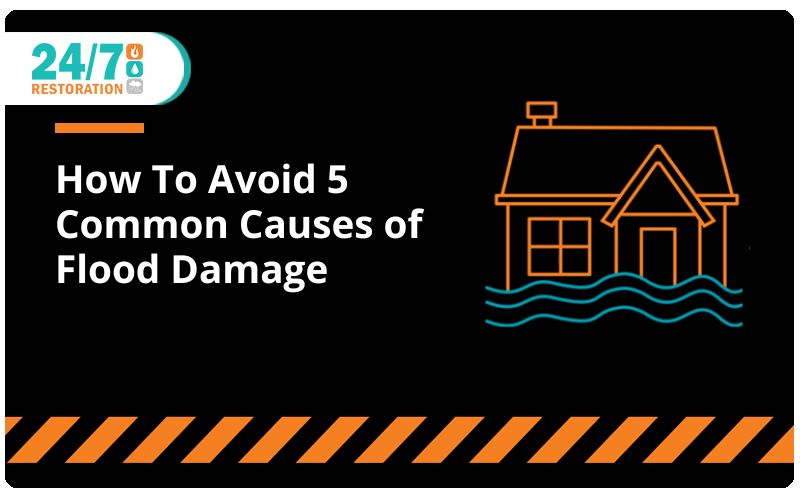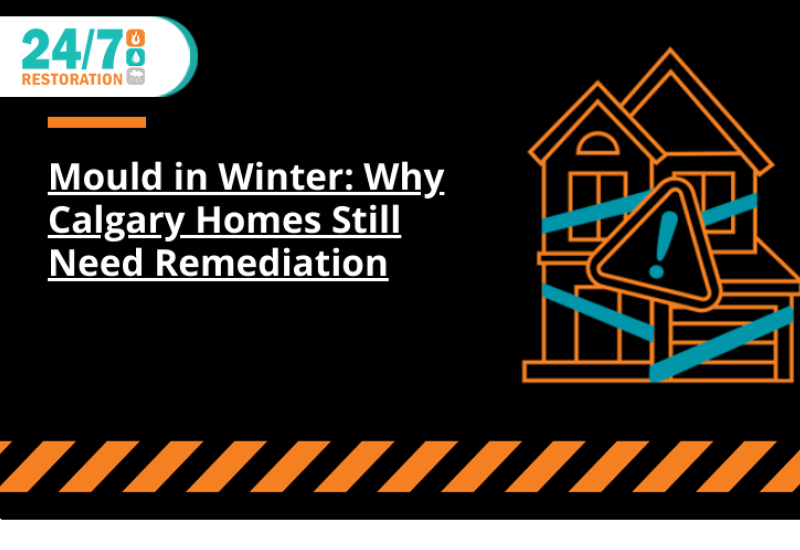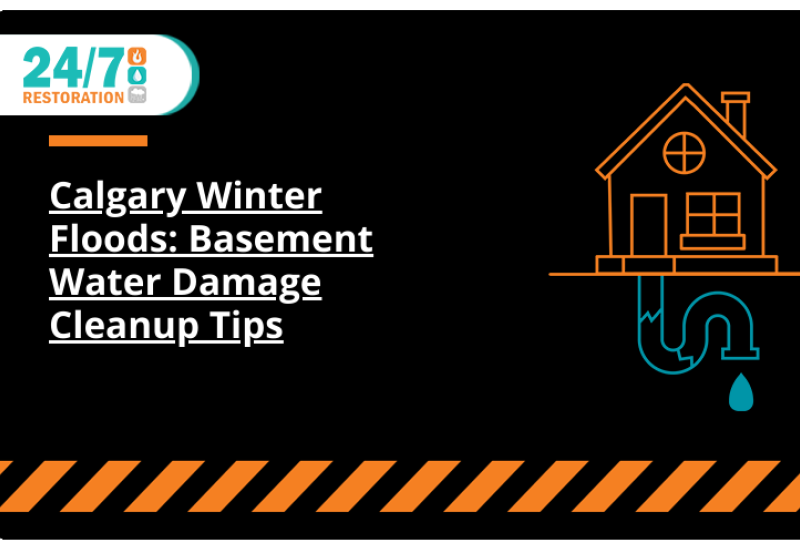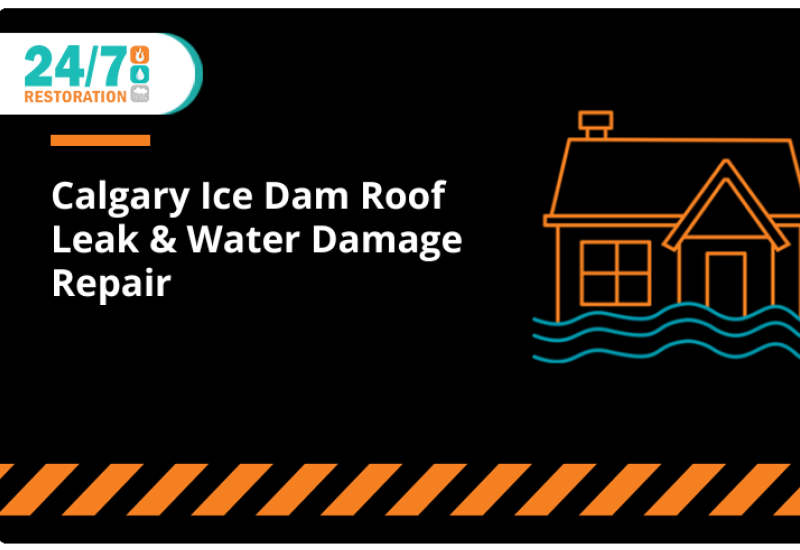Flood damage can be a stressful and expensive issue for Calgary homeowners. With unpredictable weather patterns, heavy rains, and potential snowmelt, the risk of flooding is ever-present. Floods can damage your home’s structure, ruin belongings, and create hazardous mold growth. While some floods are unavoidable, understanding the common causes can help you take preventative steps to minimize the risk. At 24/7 Restoration, we’ve helped countless homeowners recover from flood damage, and we want to help you protect your home. Here are five common causes of flood damage in Calgary and how you can avoid them.
1. Heavy Rainfall
Calgary is no stranger to heavy rainfall, especially during the summer months. Intense storms can overwhelm drainage systems and cause water to pool around your home, leading to basement flooding. When gutters, downspouts, or storm drains can’t handle the volume of water, it can seep into your home, causing damage to floors, walls, and personal belongings.
How to Avoid Flood Damage from Heavy Rainfall:
-
Maintain Your Gutters and Downspouts: Regularly clean your gutters and downspouts to ensure they are free from debris. Make sure they direct water away from your foundation to prevent water buildup near your home.
-
Install a Sump Pump: A sump pump can help remove water from your basement or crawl space during heavy rains. Consider installing a battery backup system in case of power outages.
-
Check Your Yard’s Grading: Ensure that the ground around your home slopes away from the foundation to naturally direct rainwater away from the structure.
2. Snowmelt and Ice Dams
During Calgary’s winters, snow accumulation can be substantial, and when spring arrives, rapid snowmelt can cause water to flow toward homes. Additionally, ice dams can form on roofs, causing water to pool and leak into your home through cracks in the roof or walls.
How to Avoid Flood Damage from Snowmelt and Ice Dams:
-
Clear Snow from Roofs and Gutters: Removing excess snow from your roof and ensuring gutters are clear can help prevent ice dams from forming and allow snowmelt to drain properly.
-
Insulate and Ventilate Your Attic: Proper attic insulation and ventilation can help prevent the formation of ice dams by keeping your roof at a more even temperature.
-
Shovel Snow Away from Your Home: After a heavy snowfall, shovel snow away from your home’s foundation to reduce the risk of water pooling during the spring melt.
3. Clogged or Failing Drainage Systems
Poorly maintained or clogged drainage systems are a leading cause of flood damage. Whether it’s your home’s gutters, downspouts, or local storm drains, when water has nowhere to go, it can easily overflow and find its way into your home.
How to Avoid Flood Damage from Clogged Drainage Systems:
-
Regular Drain Maintenance: Clean your gutters and downspouts at least twice a year to ensure they’re functioning properly. Make sure they are directing water away from your home’s foundation.
-
Install Gutter Guards: Gutter guards can help prevent debris buildup in your gutters, reducing the need for frequent cleaning and minimizing the risk of clogs.
-
Check Storm Drains Nearby: Ensure that storm drains near your property are clear of debris. Report any blockages to the city to prevent local flooding in your neighborhood.
4. Poorly Sealed Windows and Doors
Windows and doors that aren’t properly sealed are common entry points for floodwaters. Over time, the seals around windows and doors can deteriorate, allowing water to seep in during heavy rainstorms or snowmelt. This can lead to water damage in your home, particularly in basements and lower levels.
How to Avoid Flood Damage from Poorly Sealed Windows and Doors:
-
Inspect Seals Regularly: Regularly check the seals around your windows and doors for any signs of wear or gaps. Replace worn seals to prevent water from seeping in.
-
Use Flood Barriers or Sandbags: During severe weather events, use flood barriers or sandbags around windows and doors, especially in basements, to create an additional layer of protection.
-
Upgrade to Flood-Resistant Doors and Windows: Consider upgrading to flood-resistant doors and windows if your home is in a high-risk area. These are designed to withstand water pressure and minimize leaks.
5. Foundation Cracks
Foundation cracks can develop over time due to settling, poor construction, or shifting soil. Even small cracks can allow water to enter your basement or crawl space during heavy rains or snowmelt, leading to significant flood damage.
How to Avoid Flood Damage from Foundation Cracks:
-
Regularly Inspect Your Foundation: Look for any cracks or signs of shifting in your foundation. Address small cracks immediately to prevent water from seeping in.
-
Seal Cracks with Waterproof Sealant: Apply a waterproof sealant to any visible cracks in your foundation to prevent water intrusion. For larger cracks, contact a professional for proper repairs.
-
Install a French Drain System: A French drain system can help direct water away from your home’s foundation, reducing the risk of water seeping through cracks.
Flood damage is a serious concern for Calgary homeowners, but by understanding the common causes and taking preventative measures, you can protect your home from costly water damage. Whether it’s maintaining your drainage systems, inspecting seals around windows and doors, or addressing foundation cracks, small steps can make a big difference in keeping your home safe from floods. If flood damage does occur, 24/7 Restoration is here to help with professional flood damage restoration services. Contact us today to learn more about how we can assist you in protecting your home and restoring it after a flood.
FAQs
Q: Can a sump pump help with flood prevention?
A: A sump pump helps remove water from your basement or crawl space during heavy rains or flooding, reducing the risk of damage.
Q: What is the role of proper grading around my home?
A: Proper grading ensures that water flows away from your home’s foundation, reducing the risk of water pooling and causing damage. Call us for more personalized information.
Q: How can 24/7 Restoration help with flood damage?
A: 24/7 Restoration provides professional flood damage restoration services, including water extraction, repairs, and mold prevention. Contact us for help!




